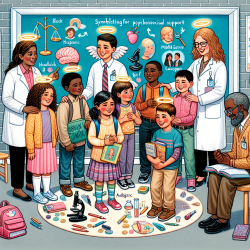Reintegrating childhood brain tumor survivors into school poses unique challenges that require a nuanced approach. The study titled Reintegration Into School After Treatment for a Brain Tumor: The Child’s Perspective offers valuable insights into the experiences of these children and provides actionable outcomes for practitioners. Here, we distill key findings from the research to help practitioners improve their skills and create better outcomes for children.
Understanding the Child's Perspective
The study emphasizes the importance of understanding the child’s perspective during reintegration. Conducted over a two-year period, it involved semi-structured interviews with five children who had returned to school after treatment. The thematic analysis revealed four major themes:
- School life and participation
- Peer relations and friendships
- Performance and difficulties
- Support and follow-up
Key Findings and Practical Applications
1. School Life and Participation
Children often see school attendance as a return to normalcy. Practitioners should facilitate this transition by minimizing disruptions in learning and maintaining social contacts. Tailored interventions that address individual needs can significantly improve the reintegration process.
2. Peer Relations and Friendships
Social interactions are a primary motivator for children returning to school. Practitioners should foster an inclusive environment by promoting peer support and understanding. This can be achieved through awareness programs and structured social activities.
3. Performance and Difficulties
Academic performance varies among survivors, often due to neurocognitive impairments from treatment. Continuous assessment and individualized educational plans are crucial. Practitioners should work closely with teachers to implement appropriate accommodations and monitor progress.
4. Support and Follow-up
Systematic follow-up is essential for addressing the evolving needs of childhood brain tumor survivors. Practitioners should ensure ongoing communication between parents, teachers, and healthcare providers to support the child's academic and psychosocial development.
Encouraging Further Research
While the study provides substantial insights, it also highlights the need for further research, particularly in understanding the long-term effects of reintegration and the specific needs at different educational stages. Practitioners are encouraged to engage in or support ongoing research efforts to continually improve strategies for school reintegration.
To read the original research paper, please follow this link: Reintegration Into School After Treatment for a Brain Tumor: The Child’s Perspective.










